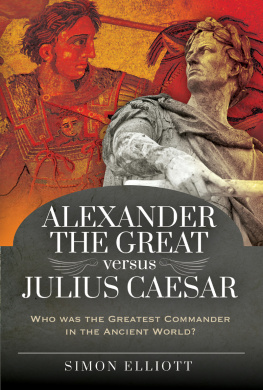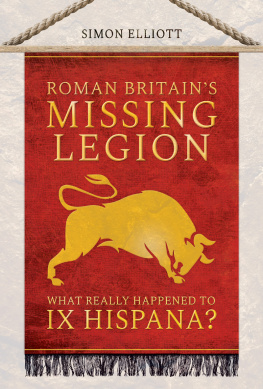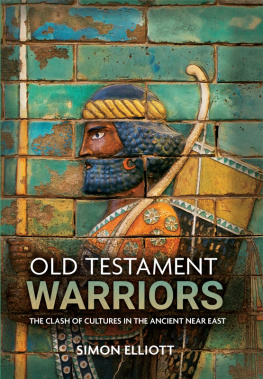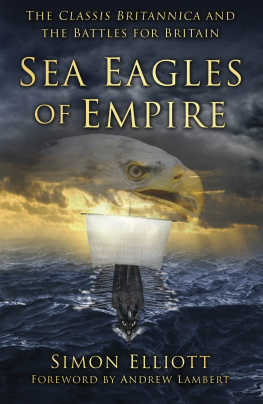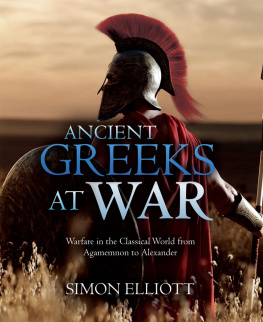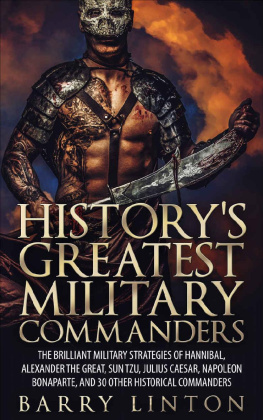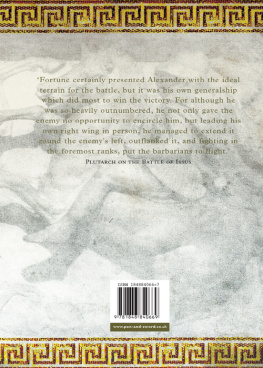Pagebreaks of the print version

Alexander the Great versus Julius Caesar
Alexander the Great versus Julius Caesar
Who was the Greatest Commander in the Ancient World?
Simon Elliott
First published in Great Britain in 2021 by
Pen & Sword Military
An imprint of
Pen & Sword Books Ltd
Yorkshire Philadelphia
Copyright Simon Elliott 2021
ISBN 978 1 52676 564 2
eISBN 9 781 526 765 659
The right of Simon Elliott to be identified as Author of this work has been asserted by him in accordance with the Copyright, Designs and Patents Act 1988.
A CIP catalogue record for this book is available from the British Library.
All rights reserved. No part of this book may be reproduced or transmitted in any form or by any means, electronic or mechanical including photocopying, recording or by any information storage and retrieval system, without permission from the Publisher in writing.
Pen & Sword Books Limited incorporates the imprints of Atlas, Archaeology, Aviation, Discovery, Family History, Fiction, History, Maritime, Military, Military Classics, Politics, Select, Transport, True Crime, Air World, Frontline Publishing, Leo Cooper, Remember When, Seaforth Publishing, The Praetorian Press, Wharncliffe Local History, Wharncliffe Transport, Wharncliffe True Crime and White Owl.
For a complete list of Pen & Sword titles please contact
PEN & SWORD BOOKS LIMITED
47 Church Street, Barnsley, South Yorkshire, S70 2AS, England
E-mail:
Website: www.pen-and-sword.co.uk
Or
PEN AND SWORD BOOKS
1950 Lawrence Rd, Havertown, PA 19083, USA
E-mail:
Website: www.penandswordbooks.com
By the same author:
Sea Eagles of Empire
Empire State: How the Roman Military Built an Empire
Septimius Severus in Scotland
Roman Legionaries
Ragstone to Riches
Julius Caesar: Romes Greatest Warlord
Old Testament Warriors
Pertinax: The Son of a Slave Who Became Roman Emperor
Romans at War
Roman Britains Missing Legion: What Really Happened to IX Hispana?
Roman Conquests: Britain
To my amazing son Alexander and his wonderful new wife Crystal. Congratulations on your wedding day!
Introduction
A lexander the Great and Gaius Julius Caesar are two of the greatest figures in world history. Comparing their careers, military and otherwise, has captured the academic and popular imagination for over two millennia. Even the great Plutarch, most prolific of the ancient worlds biographers, began his parallel lives pairing of the two by apologizing for not being able to cover in full the enormity of their achievements, saying ( Lives , Alexander, 1):
The careers of these men embrace such a multitude of events that my preamble shall consist of nothing more than this one plea: if I do not record all their most celebrated achievements or describe any of them exhaustively, but merely summarise for the most part what they accomplished, I ask my readers not to regard this as a fault.
Such was the challenge I set myself when writing my own comparison of these two immense figures on the ancient world stage. Setting out to write the book, I had an inkling in the back of my mind who I would conclude was the greatest military commander in the ancient world. The clue might be in my now-adult sons name, Alexander. Despite my being an historian best known to date for my work on the Roman world, I have always had a lifelong fascination with Alexander the Great. The boyish conqueror of the known world whose exploits were more Game of Thrones than Game of Thrones, more Tolkien than Tolkien. Initially this bordered on hero worship, only partially tempered as I grew up to appreciate that not everyone viewed his exploits from the same philhellene perspective. I particularly remember the, for me, eye-opening sequence in Professor Michael Woods superb 1990s television series In the Footsteps of Alexander the Great when he was travelling through modern Iran, where local traditions regarding Alexander were very different from those I grew up with. Similarly, when in one of the opening lectures as I began my Masters Degree in War Studies at Kings College London in the mid-2000s, the discussion referencing what we today would call Alexanders war crimes rather than the usual eulogy to his cultural and geographic conquests. Nevertheless, despite such jarring challenges to the received wisdom I had grown up with, my faith in his capabilities as a military leader remained unshakeable.
Then, as my own publishing career gathered apace, I decided to write a military biography of another great figure of the ancient world, Julius Caesar. Here, what quickly became clear is that Caesar is a far more relevant cultural reference point in the modern world than Alexander. To that end, many feel they know his story intimately. Thus, as I began the research for my 2019 Julius Caesar: Romes Greatest Warlord , I felt I also knew where that research thread would lead, and indeed what conclusions I would make. However, as this work continued, my eyes were slowly opened to what a truly astonishing story his was. Indeed it was this experience that set me thinking which of my hero Alexander and my new biographee Caesar was the ancient worlds greatest military commander.
In terms of housekeeping, in the first instance I am frequently asked why I chose Alexander and Caesar as the protagonists in this work rather than other great military leaders from the ancient world. Indeed I could have chosen from many (certainly from a western perspective given my own expertise), leading examples including Sargon the Great, Ashurbanipal, Cyrus the Great, Pyrrhus of Epirus, Hannibal Barca, Augustus (referenced many times in this work), Trajan and Belisarius. The truth is simple. It is my own opinion, nothing more and nothing less. I personally believe Alexander and Caesar were the greatest military commanders in the ancient world, and am perfectly happy for the reader to disagree.
Meanwhile, given the vast chronological and geographical scope of this work, sources of historical data are clearly of the greatest importance. Modern ones are too numerous to mention, but in terms of primary sources (and that is often a very loose definition given many were written hundreds of years after the event) the key five surviving works for Alexander include Arrian with his Anabasis Alexandri , Plutarch as detailed above, Diodorus Siculus with his Library of History , Quintus Curtius Rufus with his T he History of Alex ander and Justin with his Epitome . Most are based on contemporary histories of Alexander, for example by Ptolemy and Nearchus (see main text for detail). Meanwhile, for Caesar we can include his own Conquest of Gaul and Civil War , Cicero in his letters and various works, Sallust, Caesars legate Aulus Hirtius who added a chapter to The Gallic Wars and may have edited On the African War and On the Spanish War (both narrating Caesars activities there), Velleius with his Roman History , Plutarch again, Suetonius with his Twelve Caesars , Appian with his Roman History , Cassius Dio with his Roman History , and Jordanes with his Romana . Livy also wrote about Caesar, but his works do not survive other than as excerpts.
Referencing again the chronology covered in this book, an understanding of key periods in Greek and Roman history is useful. For the former, those referenced are the Mycenaean period from 1650 BC through to the Late Bronze Age Collapse around 1250 BC, then the Geometric or Dark Age period through to the beginning of the ninth century BC, then the Archaic period, the latter then transitioning into the Classical period from the later sixth century BC, and finally the Hellenistic period following the death of Alexander in 323 BC. For the world of Rome, the periods referenced are the Republic from 509 BC, then the Principate phase of empire beginning with the Senates first acknowledgement of Augustus as emperor in 27 BC, and finally the Dominate phase of empire from the accession of Diocletian in AD 284 through to the fall of the empire in the west in AD 476.

